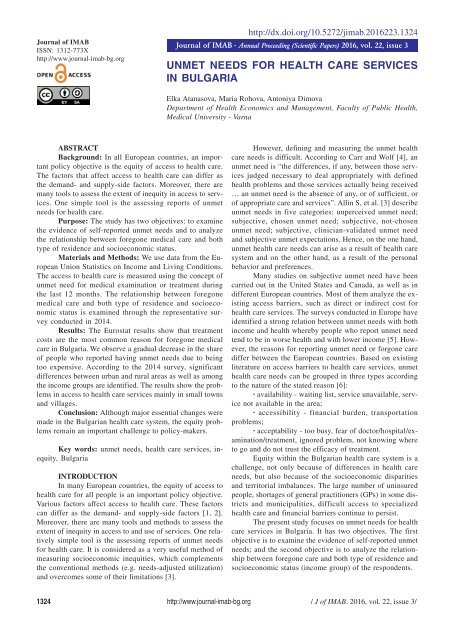JofIMAB-2016-vol22-issue3
You also want an ePaper? Increase the reach of your titles
YUMPU automatically turns print PDFs into web optimized ePapers that Google loves.
Journal of IMAB<br />
ISSN: 1312-773X<br />
http://www.journal-imab-bg.org<br />
http://dx.doi.org/10.5272/jimab.<strong>2016</strong>223.1324<br />
Journal of IMAB - Annual Proceeding (Scientific Papers) <strong>2016</strong>, vol. 22, issue 3<br />
UNMET NEEDS FOR HEALTH CARE SERVICES<br />
IN BULGARIA<br />
Elka Atanasova, Maria Rohova, Antoniya Dimova<br />
Department of Health Economics and Management, Faculty of Public Health,<br />
Medical University - Varna<br />
ABSTRACT<br />
Background: In all European countries, an important<br />
policy objective is the equity of access to health care.<br />
The factors that affect access to health care can differ as<br />
the demand- and supply-side factors. Moreover, there are<br />
many tools to assess the extent of inequity in access to services.<br />
One simple tool is the assessing reports of unmet<br />
needs for health care.<br />
Purpose: The study has two objectives: to examine<br />
the evidence of self-reported unmet needs and to analyze<br />
the relationship between foregone medical care and both<br />
type of residence and socioeconomic status.<br />
Materials and Methods: We use data from the European<br />
Union Statistics on Income and Living Conditions.<br />
The access to health care is measured using the concept of<br />
unmet need for medical examination or treatment during<br />
the last 12 months. The relationship between foregone<br />
medical care and both type of residence and socioeconomic<br />
status is examined through the representative survey<br />
conducted in 2014.<br />
Results: The Eurostat results show that treatment<br />
costs are the most common reason for foregone medical<br />
care in Bulgaria. We observe a gradual decrease in the share<br />
of people who reported having unmet needs due to being<br />
too expensive. According to the 2014 survey, significant<br />
differences between urban and rural areas as well as among<br />
the income groups are identified. The results show the problems<br />
in access to health care services mainly in small towns<br />
and villages.<br />
Conclusion: Although major essential changes were<br />
made in the Bulgarian health care system, the equity problems<br />
remain an important challenge to policy-makers.<br />
Key words: unmet needs, health care services, inequity,<br />
Bulgaria<br />
INTRODUCTION<br />
In many European countries, the equity of access to<br />
health care for all people is an important policy objective.<br />
Various factors affect access to health care. These factors<br />
can differ as the demand- and supply-side factors [1, 2].<br />
Moreover, there are many tools and methods to assess the<br />
extent of inequity in access to and use of services. One relatively<br />
simple tool is the assessing reports of unmet needs<br />
for health care. It is considered as a very useful method of<br />
measuring socioeconomic inequities, which complements<br />
the conventional methods (e.g. needs-adjusted utilization)<br />
and overcomes some of their limitations [3].<br />
However, defining and measuring the unmet health<br />
care needs is difficult. According to Carr and Wolf [4], an<br />
unmet need is “the differences, if any, between those services<br />
judged necessary to deal appropriately with defined<br />
health problems and those services actually being received<br />
… an unmet need is the absence of any, or of sufficient, or<br />
of appropriate care and services”. Allin S, et al. [3] describe<br />
unmet needs in five categories: unperceived unmet need;<br />
subjective, chosen unmet need; subjective, not-chosen<br />
unmet need; subjective, clinician-validated unmet need<br />
and subjective unmet expectations. Hence, on the one hand,<br />
unmet health care needs can arise as a result of health care<br />
system and on the other hand, as a result of the personal<br />
behavior and preferences.<br />
Many studies on subjective unmet need have been<br />
carried out in the United States and Canada, as well as in<br />
different European countries. Most of them analyze the existing<br />
access barriers, such as direct or indirect cost for<br />
health care services. The surveys conducted in Europe have<br />
identified a strong relation between unmet needs with both<br />
income and health whereby people who report unmet need<br />
tend to be in worse health and with lower income [5]. However,<br />
the reasons for reporting unmet need or forgone care<br />
differ between the European countries. Based on existing<br />
literature on access barriers to health care services, unmet<br />
health care needs can be grouped in three types according<br />
to the nature of the stated reason [6]:<br />
· availability - waiting list, service unavailable, service<br />
not available in the area;<br />
· accessibility - financial burden, transportation<br />
problems;<br />
· acceptability - too busy, fear of doctor/hospital/examination/treatment,<br />
ignored problem, not knowing where<br />
to go and do not trust the efficacy of treatment.<br />
Equity within the Bulgarian health care system is a<br />
challenge, not only because of differences in health care<br />
needs, but also because of the socioeconomic disparities<br />
and territorial imbalances. The large number of uninsured<br />
people, shortages of general practitioners (GPs) in some districts<br />
and municipalities, difficult access to specialized<br />
health care and financial barriers continue to persist.<br />
The present study focuses on unmet needs for health<br />
care services in Bulgaria. It has two objectives. The first<br />
objective is to examine the evidence of self-reported unmet<br />
needs; and the second objective is to analyze the relationship<br />
between foregone care and both type of residence and<br />
socioeconomic status (income group) of the respondents.<br />
1324 http://www.journal-imab-bg.org / J of IMAB. <strong>2016</strong>, vol. 22, issue 3/



